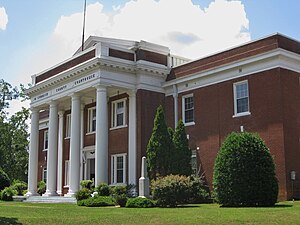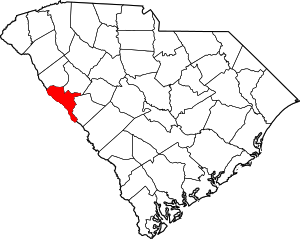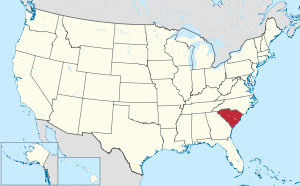County in South Carolina
| McCormick County | |
|---|---|
| County | |
 McCormick County Courthouse McCormick County Courthouse | |
 Seal Seal | |
| Motto: "The Natural Place Of Life" | |
 Location within the U.S. state of South Carolina Location within the U.S. state of South Carolina | |
 South Carolina's location within the U.S. South Carolina's location within the U.S. | |
| Coordinates: 33°54′N 82°19′W / 33.90°N 82.32°W / 33.90; -82.32 | |
| Country | |
| State | |
| Founded | 1916 |
| Named for | Cyrus McCormick |
| Seat | McCormick |
| Largest community | McCormick |
| Area | |
| • Total | 393.61 sq mi (1,019.4 km) |
| • Land | 358.87 sq mi (929.5 km) |
| • Water | 34.74 sq mi (90.0 km) 8.83% |
| Population | |
| • Total | 9,526 |
| • Estimate | 9,941 |
| • Density | 26.54/sq mi (10.25/km) |
| Time zone | UTC−5 (Eastern) |
| • Summer (DST) | UTC−4 (EDT) |
| Congressional district | 3rd |
| Website | mccormickcountysc |
McCormick County is a county located in the U.S. state of South Carolina. As of the 2020 census, its population was 9,526, making it the second-least populous county in South Carolina. Its county seat is McCormick. The county was formed in 1916 from parts of Edgefield, Abbeville, and Greenwood counties.
History
The county was founded in 1916 with portions of Edgefield, Abbeville, and Greenwood counties and was named after Cyrus McCormick. The largest community and county seat is McCormick.
Geography
Interactive map of McCormick CountyAccording to the U.S. Census Bureau, the county has a total area of 393.61 square miles (1,019.4 km), of which 358.87 square miles (929.5 km) is land and 34.74 square miles (90.0 km) (8.83%) is water. It is the smallest county in South Carolina by land area and second-smallest by total area. McCormick County is in the Savannah River basin.
National protected area
- Sumter National Forest (part)
State and local protected areas/sites
- Baker Creek State Park
- Eden Hall
- Hamilton Branch State Recreation Area
- Hickory Knob State Resort Park
- James L. Mason Wildlife Management Area
- Leroys Ferry Recreation Area
- Long Cane Creek Picnic Area
- Parksville Recreation Area
- Price's Mill
- Savannah Lakes Beach
- Stevens Creek Heritage Preserve/Wildlife Management Area (part)
- Sumter National Forest - Long Cane Ranger District
Major water bodies
Adjacent counties
- Greenwood County – northeast
- Edgefield County – east
- Columbia County, Georgia – south
- Lincoln County, Georgia – west
- Elbert County, Georgia – northwest
- Abbeville County – northwest
Major highways
Demographics
| Census | Pop. | Note | %± |
|---|---|---|---|
| 1920 | 16,444 | — | |
| 1930 | 11,471 | −30.2% | |
| 1940 | 10,367 | −9.6% | |
| 1950 | 9,577 | −7.6% | |
| 1960 | 8,629 | −9.9% | |
| 1970 | 7,955 | −7.8% | |
| 1980 | 7,797 | −2.0% | |
| 1990 | 8,868 | 13.7% | |
| 2000 | 9,958 | 12.3% | |
| 2010 | 10,233 | 2.8% | |
| 2020 | 9,526 | −6.9% | |
| 2023 (est.) | 9,941 | 4.4% | |
| U.S. Decennial Census 1790–1960 1900–1990 1990–2000 2010 2020 | |||
2020 census
| Race | Num. | Perc. |
|---|---|---|
| White (non-Hispanic) | 5,155 | 54.12% |
| Black or African American (non-Hispanic) | 3,916 | 41.11% |
| Native American | 27 | 0.28% |
| Asian | 36 | 0.38% |
| Pacific Islander | 2 | 0.02% |
| Other/Mixed | 267 | 2.8% |
| Hispanic or Latino | 123 | 1.29% |
As of the 2020 census, there were 9,526 people, 3,957 households, and 2,513 families residing in the county.
2010 census
At the 2010 census, there were 10,233 people, 4,027 households, and 2,798 families living in the county. The population density was 28.5 inhabitants per square mile (11.0/km). There were 5,453 housing units at an average density of 15.2 per square mile (5.9/km). The racial makeup of the county was 49.7% black or African American, 48.7% white, 0.3% Asian, 0.1% Pacific islander, 0.1% American Indian, 0.2% from other races, and 0.9% from two or more races. Those of Hispanic or Latino origin made up 0.8% of the population. In terms of ancestry, 10.7% were English, 10.2% were American, 10.2% were German, and 6.0% were Irish.
Of the 4,027 households, 21.0% had children under the age of 18 living with them, 50.4% were married couples living together, 15.2% had a female householder with no husband present, 30.5% were non-families, and 27.4% of all households were made up of individuals. The average household size was 2.22 and the average family size was 2.65. The median age was 50.0 years.
The median income for a household in the county was $35,858 and the median income for a family was $43,021. Males had a median income of $32,606 versus $28,067 for females. The per capita income for the county was $19,411. About 14.2% of families and 18.2% of the population were below the poverty line, including 37.6% of those under age 18 and 7.9% of those age 65 or over.
2000 census
At the 2000 census, there were 9,958 people, 3,558 households and 2,604 families living in the county. The population density was 28 people per square mile (11 people/km). There were 4,459 housing units at an average density of 12 per square mile (4.6/km). The racial makeup of the county was 53.88% Black or African American, 44.78% White, 0.07% Native American, 0.29% Asian, 0.03% Pacific Islander, 0.38% from other races, and 0.57% from two or more races. 0.86% of the population were Hispanic or Latino of any race.
There were 3,558 households, out of which 24.80% had children under the age of 18 living with them, 51.80% were married couples living together, 17.60% had a female householder with no husband present and 26.80% were non-families. 24.40% of all households were made up of individuals, and 10.20% had someone living alone who was 65 years of age or older. The average household size was 2.39 and the average family size was 2.82.
In the county, the population was spread out, with 19.50% under the age of 18, 8.30% from 18 to 24, 27.60% from 25 to 44, 28.10% from 45 to 64 and 16.50% who were 65 years of age or older. The median age was 41 years. For every 100 females there were 113.70 males. For every 100 females age 18 and over, there were 115.80 males.
The median income for a household in the county was $31,577, and the median income for a family was $38,822. Males had a median income of $28,824 versus $21,587 for females. The per capita income for the county was $14,770. About 15.10% of families and 17.90% of the population were below the poverty line, including 26.50% of those under age 18 and 11.90% of those age 65 or over.
Government and politics
Like most rural South Carolina counties with a tight Black-white population ratio, the Democratic Party has fared well in McCormick County compared to others across the South, especially with the national party's cultural turn to the left in the 2000s and 2010s. However, in 2016 Donald Trump won the county by one fewer vote than Barack Obama did in 2012, marking the first GOP victory in the area since Richard Nixon in 1972.
| Year | Republican | Democratic | Third party(ies) | |||
|---|---|---|---|---|---|---|
| No. | % | No. | % | No. | % | |
| 2024 | 3,565 | 57.94% | 2,513 | 40.84% | 75 | 1.22% |
| 2020 | 2,958 | 51.92% | 2,687 | 47.17% | 52 | 0.91% |
| 2016 | 2,652 | 50.84% | 2,479 | 47.53% | 85 | 1.63% |
| 2012 | 2,467 | 47.81% | 2,653 | 51.41% | 40 | 0.78% |
| 2008 | 2,437 | 46.58% | 2,755 | 52.66% | 40 | 0.76% |
| 2004 | 2,396 | 46.78% | 2,648 | 51.70% | 78 | 1.52% |
| 2000 | 1,704 | 46.54% | 1,896 | 51.79% | 61 | 1.67% |
| 1996 | 1,104 | 35.35% | 1,858 | 59.49% | 161 | 5.16% |
| 1992 | 899 | 29.46% | 1,846 | 60.48% | 307 | 10.06% |
| 1988 | 1,172 | 40.22% | 1,722 | 59.09% | 20 | 0.69% |
| 1984 | 1,186 | 43.51% | 1,526 | 55.98% | 14 | 0.51% |
| 1980 | 797 | 30.60% | 1,774 | 68.10% | 34 | 1.31% |
| 1976 | 640 | 26.37% | 1,774 | 73.09% | 13 | 0.54% |
| 1972 | 1,302 | 60.22% | 844 | 39.04% | 16 | 0.74% |
| 1968 | 466 | 21.08% | 988 | 44.69% | 757 | 34.24% |
| 1964 | 939 | 65.34% | 498 | 34.66% | 0 | 0.00% |
| 1960 | 347 | 33.79% | 680 | 66.21% | 0 | 0.00% |
| 1956 | 102 | 11.74% | 485 | 55.81% | 282 | 32.45% |
| 1952 | 577 | 48.04% | 624 | 51.96% | 0 | 0.00% |
| 1948 | 0 | 0.00% | 30 | 4.04% | 713 | 95.96% |
| 1944 | 1 | 0.28% | 307 | 86.72% | 46 | 12.99% |
| 1940 | 11 | 2.56% | 419 | 97.44% | 0 | 0.00% |
| 1936 | 8 | 1.20% | 656 | 98.80% | 0 | 0.00% |
| 1932 | 5 | 0.93% | 530 | 99.07% | 0 | 0.00% |
| 1928 | 20 | 3.14% | 615 | 96.70% | 1 | 0.16% |
| 1924 | 15 | 2.72% | 520 | 94.37% | 16 | 2.90% |
| 1920 | 0 | 0.00% | 557 | 100.00% | 0 | 0.00% |
| 1916 | 0 | 0.00% | 637 | 99.69% | 2 | 0.31% |
Economy
In 2022, the GDP was $278 million (about $27,961 per capita), and the real GDP was $222.8 million (about $22,410 per capita) in chained 2017 dollars.
As of April 2024, some of the largest employers in the county include Food Lion, the United States Department of Defense, and the United States Postal Service.
| Industry | Employment Counts | Employment Percentage (%) | Average Annual Wage ($) |
|---|---|---|---|
| Accommodation and Food Services | 94 | 5.5 | 16,484 |
| Administrative and Support and Waste Management and Remediation Services | 66 | 3.9 | 42,224 |
| Agriculture, Forestry, Fishing and Hunting | 37 | 2.2 | 41,548 |
| Construction | 92 | 5.4 | 50,336 |
| Finance and Insurance | 23 | 1.3 | 50,648 |
| Health Care and Social Assistance | 351 | 20.5 | 34,996 |
| Information | 5 | 0.3 | 70,304 |
| Manufacturing | 113 | 6.6 | 42,588 |
| Other Services (except Public Administration) | 205 | 12.0 | 28,600 |
| Professional, Scientific, and Technical Services | 85 | 5.0 | 65,208 |
| Public Administration | 380 | 22.2 | 47,528 |
| Real Estate and Rental and Leasing | 23 | 1.3 | 94,380 |
| Retail Trade | 226 | 13.2 | 23,764 |
| Wholesale Trade | 13 | 0.8 | 34,268 |
| Total | 1,713 | 100.0% | 38,862 |
Communities
Towns
- McCormick (county seat and largest community)
- Parksville
- Plum Branch
Census-designated places
Notable people
- Johnny Letman, musician
- Patrick Noble, governor of South Carolina (1838–1840)
See also
- List of counties in South Carolina
- National Register of Historic Places listings in McCormick County, South Carolina
References
- ^ "QuickFacts: McCormick County, South Carolina". United States Census Bureau. Retrieved March 22, 2024.
- "Find a County". National Association of Counties. Archived from the original on May 31, 2011. Retrieved June 7, 2011.
- "South Carolina: Individual County Chronologies". South Carolina Atlas of Historical County Boundaries. The Newberry Library. 2009. Archived from the original on January 3, 2017. Retrieved March 21, 2015.
- "2020 County Gazetteer Files – South Carolina". United States Census Bureau. August 23, 2022. Retrieved September 10, 2023.
- ^ "SCDNR Public Lands". www2.dnr.sc.gov. Retrieved April 1, 2023.
- "U.S. Decennial Census". United States Census Bureau. Retrieved March 18, 2015.
- "Historical Census Browser". University of Virginia Library. Retrieved March 18, 2015.
- Forstall, Richard L., ed. (March 27, 1995). "Population of Counties by Decennial Census: 1900 to 1990". United States Census Bureau. Retrieved March 18, 2015.
- "Census 2000 PHC-T-4. Ranking Tables for Counties: 1990 and 2000" (PDF). United States Census Bureau. April 2, 2001. Archived (PDF) from the original on October 9, 2022. Retrieved March 18, 2015.
- ^ "State & County QuickFacts". United States Census Bureau. Archived from the original on July 17, 2011. Retrieved November 25, 2013.
- "Explore Census Data". data.census.gov. Retrieved December 15, 2021.
- ^ "DP-1 Profile of General Population and Housing Characteristics: 2010 Demographic Profile Data". United States Census Bureau. Archived from the original on February 13, 2020. Retrieved March 11, 2016.
- "Population, Housing Units, Area, and Density: 2010 - County". United States Census Bureau. Archived from the original on February 13, 2020. Retrieved March 11, 2016.
- "DP02 SELECTED SOCIAL CHARACTERISTICS IN THE UNITED STATES – 2006-2010 American Community Survey 5-Year Estimates". United States Census Bureau. Archived from the original on February 13, 2020. Retrieved March 11, 2016.
- "DP03 SELECTED ECONOMIC CHARACTERISTICS – 2006-2010 American Community Survey 5-Year Estimates". United States Census Bureau. Archived from the original on February 13, 2020. Retrieved March 11, 2016.
- "U.S. Census website". United States Census Bureau. Retrieved May 14, 2011.
- Leip, David. "Dave Leip's Atlas of U.S. Presidential Elections". uselectionatlas.org. Retrieved March 13, 2018.
- U.S. Bureau of Economic Analysis (January 1, 2001). "Gross Domestic Product: All Industries in McCormick County, SC". FRED, Federal Reserve Bank of St. Louis. Retrieved May 4, 2024.
- U.S. Bureau of Economic Analysis (January 1, 2001). "Real Gross Domestic Product: All Industries in McCormick County, SC". FRED, Federal Reserve Bank of St. Louis. Retrieved May 4, 2024.
- ^ "McCormick County" (PDF). Community Profiles (04000065). Columbia, SC: S.C. Department of Employment & Workforce - Business Intelligence Department. April 19, 2024.
External links
 Geographic data related to McCormick County, South Carolina at OpenStreetMap
Geographic data related to McCormick County, South Carolina at OpenStreetMap- Official website
| Places adjacent to McCormick County, South Carolina | ||||||||||||||||
|---|---|---|---|---|---|---|---|---|---|---|---|---|---|---|---|---|
| ||||||||||||||||
| Municipalities and communities of McCormick County, South Carolina, United States | ||
|---|---|---|
| County seat: McCormick | ||
| Towns |  | |
| CDPs | ||
| Unincorporated community | ||
| Central Savannah River Area (CSRA) | |
|---|---|
| Central Savannah River Area of Georgia and South Carolina | |
| State of South Carolina | |
|---|---|
| Columbia (capital) | |
| Regions | |
| Larger cities | |
| Smaller cities |
|
| Towns |
|
| CDPs | |
| Counties |
|
| Topics | |
| Society | |